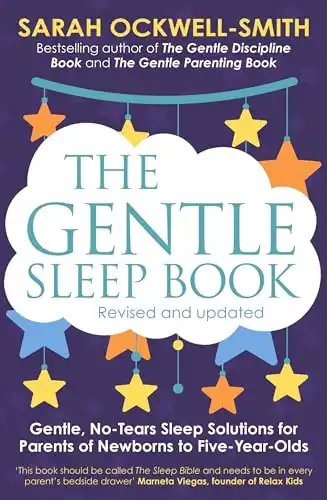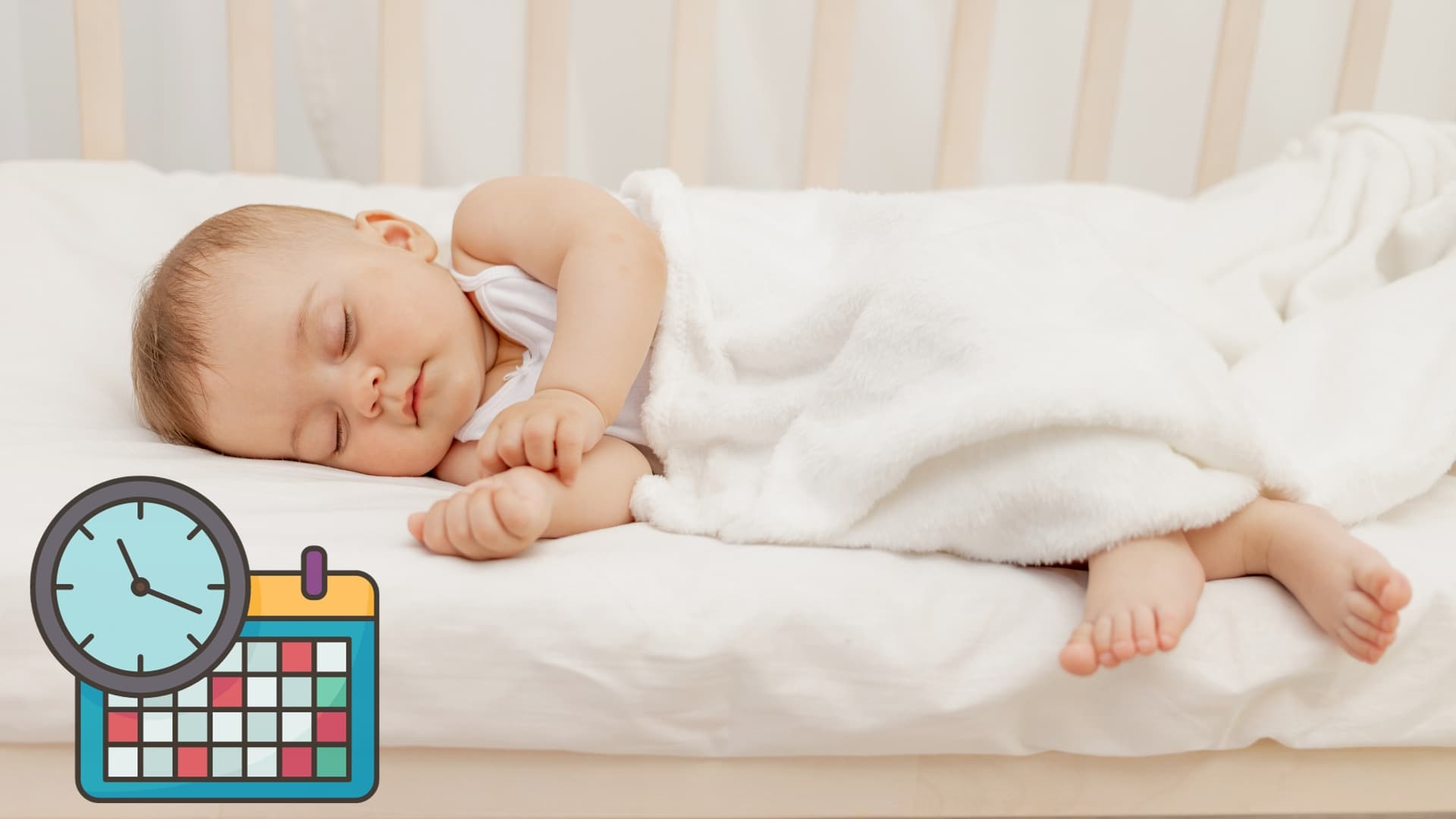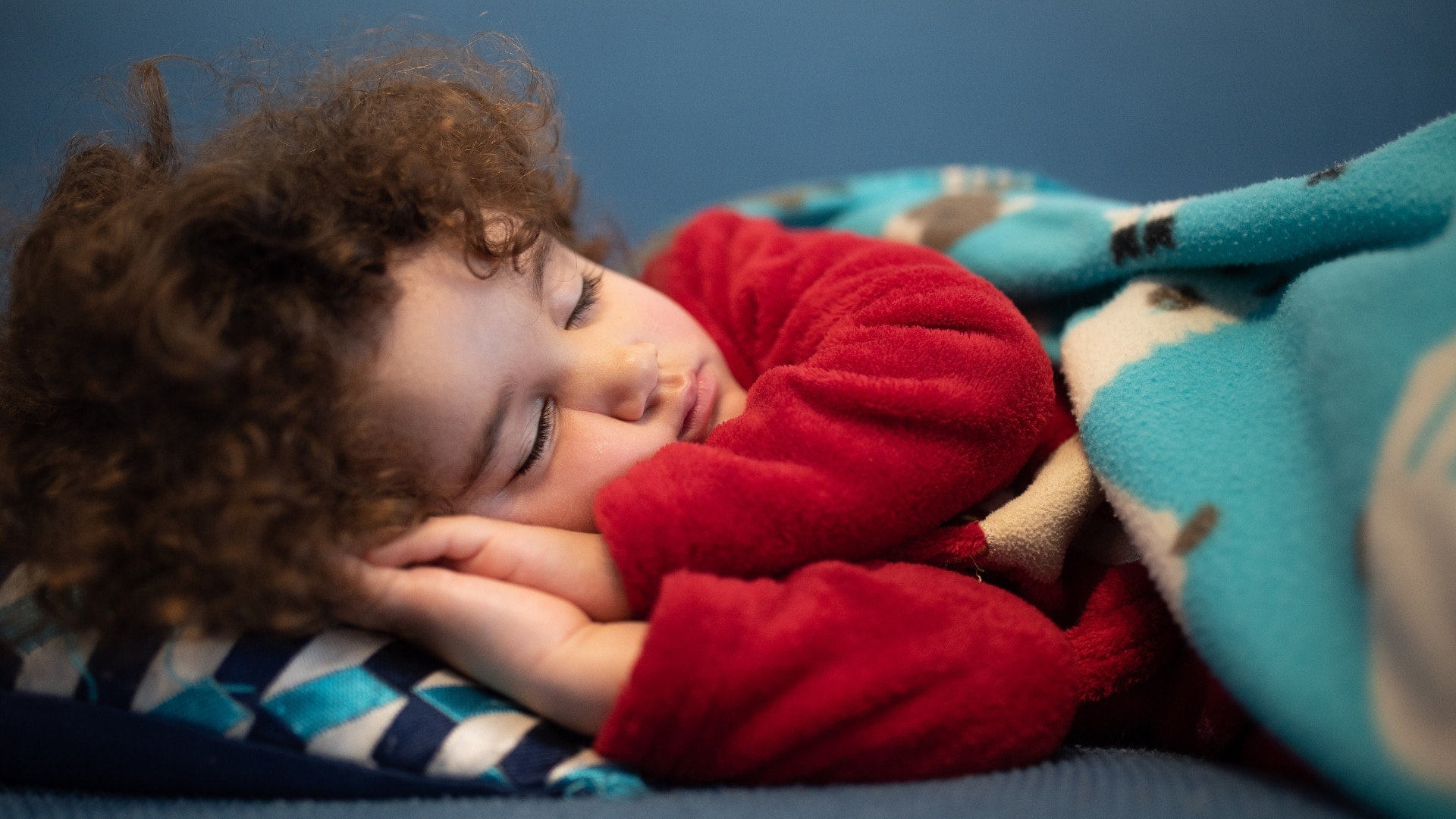Sleep training a 3-month-old involves teaching your child healthy sleep habits that will help them fall asleep on their own and stay asleep throughout the night. But it’s not sleep training in the conventional way…
There is a lot more to sleep training a 3-month-old than letting your little one cry it out and the more informed you are, the better. So without further ado, let’s get into it.

Table of Contents
Is A 3-Month-Old Too Young To Sleep Train?
In my opinion and experience, 3-month-old babies are too young for conventional sleep training methods. Instead, parents should focus on establishing healthy sleep habits that can make the need for sleep training later on unnecessary.
However, the concept of sleep training refers to helping your infant learn to fall asleep on their own. And at 3 months, many infants begin to develop a more regular sleep pattern and naturally start to sleep for longer stretches at night.
For this reason, parents might look into sleep training a 3-month-old to help solidify these sleep habits from an early age.
If you are considering sleep training for your 3-month-old, it’s important to acknowledge a few key points:
- Newborns and younger infants still require night feedings meaning you will have to implement your sleep training method after every waking (which is why I do not recommend sleep training babies of this age)
- Around 3 months, babies start learning the skill of self-soothing, which is essential for sleep training. Despite this, it’s still early days, and depending on your baby’s personality, they may struggle with being left alone.
- You must always consult with your pediatrician before beginning any sleep training method to ensure it is appropriate for your baby’s development.
NOTE: I found this wonderful poem from Paula Morales McDowell recently which summarises how I have raised children over 40+ years as a Norland Nanny and mother. You can download a FREE copy of this poem on Paula’s website here.
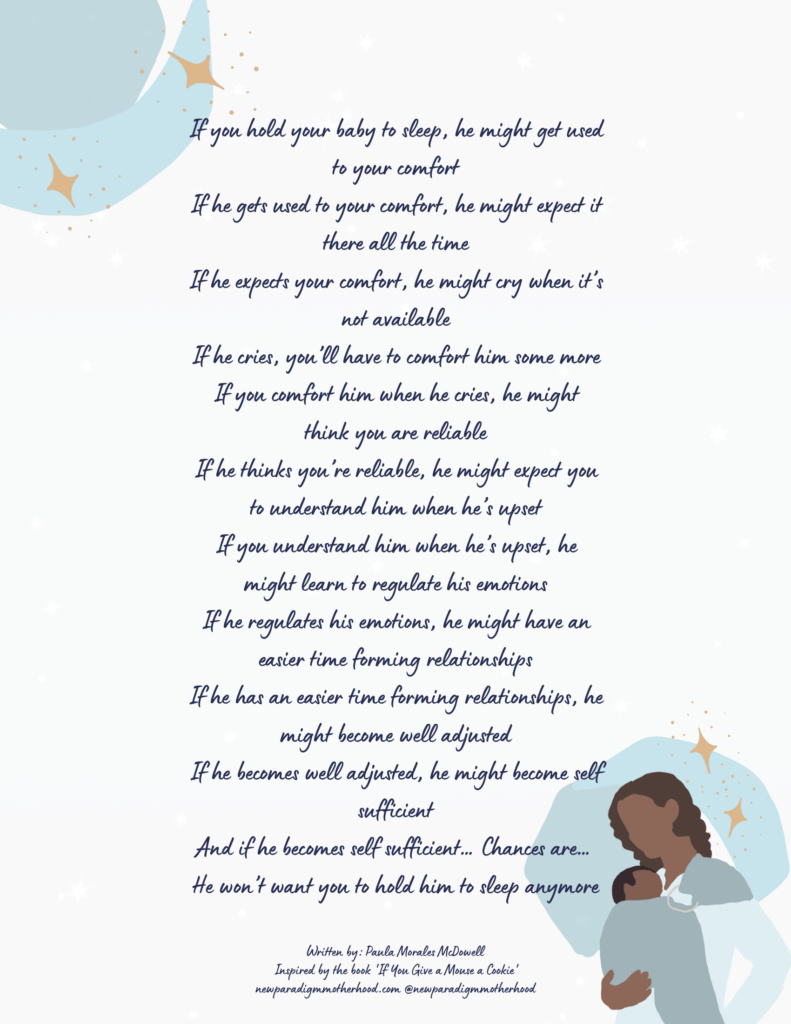
Why Sleep Training Is Important For Babies
Sleep training is the process of helping your baby develop good sleep habits and learn to sleep independently.
But why exactly is it important?
Firstly, consistent sleep patterns are essential for cognitive and physical growth. At 3 months, your baby is learning new skills and growing at a rapid rate. Quality sleep will support this early development.
Secondly, establishing good sleep habits early on can prevent long-term sleep issues. It sets a healthy foundation for your child’s future sleep into adulthood.
Remember, you’re not just teaching baby how to sleep; you’re teaching them self-soothing skills.
Finally, it’s important for your well-being too. When your baby sleeps better, so does the parent. With more rest, you’re able to be a more patient and attentive parent. This benefits your whole family’s overall happiness and health.
Looking to get your little one to sleep quickly and effortlessly? Check out my Bedtime and Nap Cheat Sheet and master the art of making daytime naps and bedtimes as seamless as possible.
A bedtime & nap cheat sheet so good your little one will ask you to put them to bed...
Laura Williams "This is a life saver! I'm so glad I downloaded your bedtime & nap cheat sheet. My little one actually asked me to put him to bed last night! Unbelievable! Thank you so much!"
Click Here For The FREE Cheat Sheet
How To Sleep Train A 3-Month-Old Baby
If you have spoken to a pediatric sleep consultant and you’ve decided you would like to try sleep training a 3-month-old baby…
You should to know that conventional sleep training methods like the Ferber Method, Chair Method, and Cry-It-Out Method are not suitable until baby is at least 4 months of age.
In fact, the Cry It Out (CIO) method is something I would actively discourage trying until baby is at least 6 months old. In my opinion, it is not age-appropriate and too overwhelming for a younger infant.
At 3 months old, implementing soothing techniques that foster security and sleep associations is more beneficial and age-appropriate, as well as laying the foundations of healthy sleep.
The top things you can do to “sleep train” a 3-month-old include:
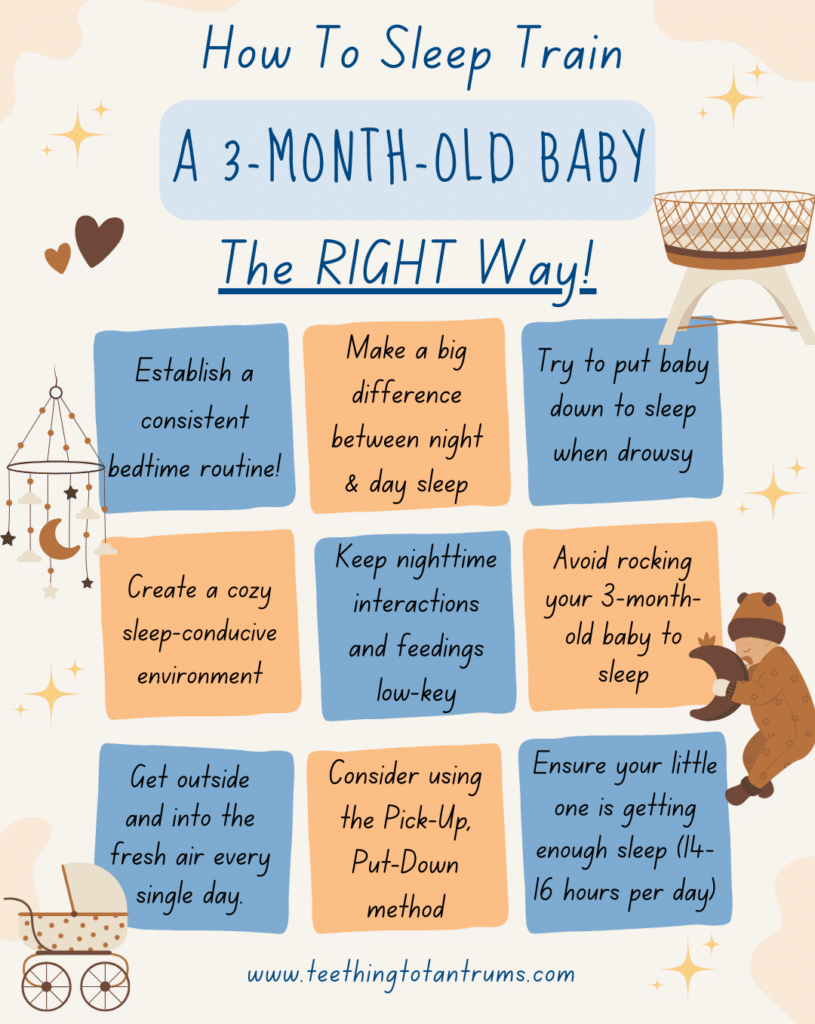
- Start to establish a recognizable and regular bedtime routine that includes a warm bath, and baby massage, followed by calming activities like reading or singing lullabies.
- Make a marked difference between daytime and nighttime sleep.
- Put baby down to sleep while drowsy but not fast asleep.
- Create a sleep-conducive environment in your baby’s room that is dimly lit and at the correct temperature. Use a white noise machine to prevent ambient noise from disturbing your little one especially if they are sleeping in the same room as you.
- Keep nighttime interactions and feedings low-key with little to no talking and no bright lights. Consider using a nightlight to help keep the sleep environment consistent.
- If your little one has been fed and changed, try and settle your baby back to sleep in their crib without rocking them to sleep in your arms.
- If your baby struggles to settle without your touch, try the Pick-Up, Put-Down Method. This method involves comforting your baby when they cry by picking them up. Once they’re calm, you put them back down in their crib to reassure them with a tummy rub. Repeat until they fall asleep.
- Get outside in the fresh air and natural light every day to balance your baby’s circadian rhythm and melatonin levels and promote healthy sleep.
- Ensure your little one is getting enough age-appropriate daytime sleep to avoid overtiredness which can disrupt the entire sleep schedule. Read my post on the 3-Month Sleep Schedule to learn what to expect.
Remember, it’s crucial to consider your baby’s unique needs. While some 3-month-olds may respond well to these gentle sleep training methods, others may need a bit more time to learn to sleep independently.
And that’s OK!
NOTE: I want to emphasize from the start that you should never leave your 3-month-old to cry it out and that it is normal for babies of this age to wake frequently. Bonding with your little one and providing love and physical contact should be your priority in the early months.
How Long Does It Take To Sleep Train A 3-Month-Old Baby?
If you choose to sleep train your 3-month-old, it can take anywhere from 3 days to 2 weeks to establish successful sleep habits.
However, you must remember that each baby is different.
For some 3-month-olds, implementing the top tips I outlined above will have quick results and you will notice your little one being able to start to fall asleep independently and for longer.
However, for other babies, you will have to go with the flow as it means your little one is not ready to sleep independently yet.
When introducing gentle sleep training for your baby, consistency is key to success as well as being well-informed about what you can expect from your baby at this stage of their development.
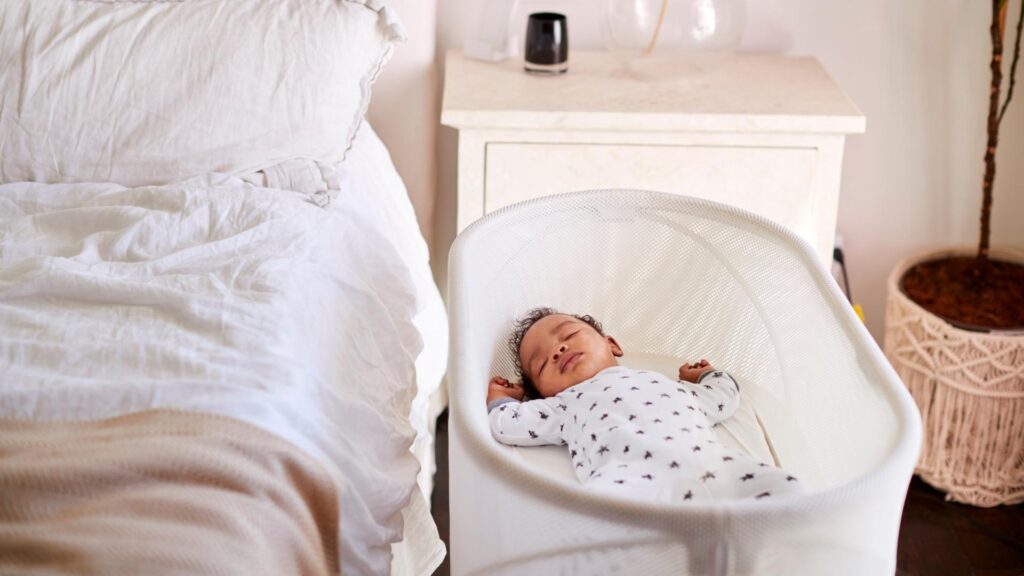
Sleep Training Books I Recommend For Babies
If you’re exploring sleep training for your 3-month-old baby, you’ll find invaluable advice in books.
Having researched sleep training extensively and specializing in sleep issues as a Norland Nanny, here are what I consider the 2 must-read baby sleep training books.
1. Healthy Sleep Habits, Happy Child by Dr. Marc Weissbluth
A fantastic sleep training resource for parents of young babies is “Healthy Sleep Habits, Happy Child” by Dr. Marc Weissbluth. It’s full of research-based tips and a step-by-step plan to help you understand the importance of sleep and how to foster it in your baby’s life.
In this brilliant book, backed by decades of research and case studies, Dr. Weissbluth presents the Ferber method, a gentle form of sleep training that involves teaching babies to fall asleep independently with check-ins.
Charts and routines cover naps, nighttime sleep, and adjusting schedules. The book also addresses common issues like bedsharing, co-sleeping, night wakings, and daytime sleepiness giving you an all-inclusive sleep training approach!
- Provides individualized plans based on baby's exact age
- Evidence-based and developmentally appropriate
- Addresses a wide variety of common sleep questions
- Offers flexibility within routines based on baby's temperament and needs
- Teaches independent sleep skills
- Requires consistency to see full effects
- Focuses heavily on rigid routines and schedules
- May be overwhelming amount of information for some
- The adaption of the Ferber Method can be difficult for some babies to handle
2. The Gentle Sleep Book by Sarah Ockwell-Smith
The Gentle Sleep Book covers a wide range of ages from 0-5 years but I have included it in my list as I know from personal experience many parents who have used it and found it invaluable and refer to it as their ‘Sleep Bible’.
I believe this book is ideal for parents who are more relaxed about sleep training but still want to raise a child with healthy sleep habits.
Sarah Ockwell Smith provides a holistic insight into childhood sleep in this book. She explains that very often our expectations are way too high when we expect our little ones to sleep through the night and that we aim for this perfection when they are not developmentally programmed to do so.
In a lot of ways, this is a book that makes parents who are battling with sleep issues feel ‘OK’ with what they are doing whether that be co-sleeping or nursing to sleep.
If you are happy to take this more relaxed approach to sleep training then this is probably the book for you.
- Offers a gentle approach to sleep training
- Offers reliable evidence-based advice
- Deals with night wakings as well as bedtime issues
- Offers advice for each developmental stage
- Covers how to deal with daytime nap issues too
- Mentions that bed sharing is OK... which is not for everyone
- The solutions take time... however, there's never a quick fix
- May be considered more of a parent self-help book than a sleep training book
When To Seek Medical Advice For Baby’s Sleep Issues
If you notice unusual patterns in your baby’s sleep-wake cycle your best course of action is to consult a pediatrician. You may need to seek medical advice if your baby:
- Stays awake for long hours without showing signs of tiredness
- Demonstrates consistent difficulty in falling or staying asleep
- Experiences disrupted sleep despite a regular sleep schedule and consistent bedtime routine
- You suspect your baby’s feeding schedule, including night feedings or bottle preparations, might be affecting their sleep.
- Your baby seems unusually irritable, fussy, or sleepy during the day.
- There’s a sudden change in appetite or feeding patterns.
- Night feedings don’t appear to be satiating, causing restlessness.
- Consistent bottle feeding doesn’t seem to aid in your baby’s sleep.
- Baby cries in sleep consistently.
Remember, you know your baby best. Do not hesitate to get a doctor’s opinion if something feels off.
Early intervention by a healthcare professional can provide peace of mind and ensure your baby’s health and well-being.
Will Sleep Training Harm A 3-Month-Old?
Contrary to some concerns, when done properly sleep training does not harm children. Research shows it can benefit both parents and babies.
A study by the American Academy of Pediatrics divided infants into two groups – one went through sleep training, and the other did not. They measured the babies’ cortisol stress levels, parental satisfaction, parental stress, and the children’s attachment styles at one year old.
Results found that babies who were sleep-trained had decreased cortisol by the end of the training, indicating lower stress.
And at one year old, there was no difference in attachment style or behavior between the groups.
So with the right methods and environment, sleep training helps babies learn to self-soothe without negatively impacting development.
If you’re concerned about sleep training a 3-month-old, talk to your pediatrician and consider waiting a few months before you implement any sleep strategies.
Frequently Asked Questions About Sleep Training A 3-Month-Old
Parenting a 3-month-old can bring up many questions about sleep training. This section aims to address those common inquiries to help guide you through the process.
Q: What are the most effective sleep training methods for infants?
A: For infants, particularly those around 3 months of age, gentle sleep training methods and instilling healthy habits are best. These can include techniques like fading, where you gradually reduce your presence in the baby’s room, and the pick-up, put-down method to settle baby. It’s crucial to adjust methods based on your baby’s temperament and your family’s needs.
Q: How can I teach my 3-month-old to self-soothe during the night?
A: To help your 3-month-old self-soothe, establish a consistent bedtime routine and a calming environment. You can also try putting your baby down drowsy but awake so they can learn to fall asleep on their own. Praise or reassurance, when they calm themselves, can reinforce this behavior without immediate intervention.
Q: What is an appropriate sleep schedule for a 3-month-old baby?
A: At 3 months, your baby should sleep 14 to 16 hours in a 24 hour period, including naps. An appropriate schedule might involve 4 to 5 hours of naptime spread throughout the day and 9 to 11 hours of sleep at night. Observe your baby’s sleep cues and adapt the schedule as needed for their natural sleep patterns and wake windows.
Q: What should I do when my baby cries at night?
A: As parents, it’s normal to worry when your baby cries or fusses in the night. But during sleep training, it’s important to breathe and keep to the plan. Allowing your 3 month old baby to cry for very short periods can be part of the sleep training process… but only if you are comfortable doing so and your baby is not becoming very distressed.
Full-blown crying will, of course, need your instant attention, but a bit of fussing can be left for a few minutes to see if your little one resettles on their own, especially if you know they are well-fed and comfortable.
Q: How long is it considered safe to let a 3-month-old cry when trying cry-it-out techniques?
A: I do not recommend the cry-it-out technique for 3-month-olds. So no length of time is suitable to let baby fully cry it out. A little bit of fussing is fine at this age… but it’s essential to respond to your baby’s needs and ensure they feel safe and secure.
Q: Are there specific sleep training books recommended for parents of 3-month-olds?
A: There are many sleep training books available; however, look for those focusing on gentle methods suitable for younger infants. Books by pediatricians or child sleep experts are often helpful. These can provide you with a variety of techniques and tips specifically tailored for your baby’s developmental stage. Click here to discover my favorite sleep training books for parents of 3-month-olds.
Q: How do developmental milestones affect sleep training at 3 months?
A: Developmental milestones, like increased social awareness and physical mobility, can affect sleep patterns in 3-month-olds. These changes may disrupt sleep temporarily, so it’s essential to be patient and adjust your sleep training approach as needed while your baby grows and develops new skills.
Need More Parenting Help?
- Download our FREE Perfect Sleep Cheat Sheet. It’s a free, easy-to-use and proven formula designed for parents of 0-5 year olds to master the art of consistently undisturbed and restful sleep without the yelling, nagging or exhausting long-winded evenings.
- Check out our Parenting Toolbox. You’ll get access to expertly-chosen products that you can guarantee are the best for your little one and your wallet.
- Ready to create the calm, peaceful evenings you deserve? Then checkout our most popular course - The Bedtime Battles Masterclass

A bedtime & nap cheat sheet so good your little one will ask you to put them to bed...
Laura Williams "This is a life saver! I'm so glad I downloaded your bedtime & nap cheat sheet. My little one actually asked me to put him to bed last night! Unbelievable! Thank you so much!"
Click Here For The FREE Cheat Sheet

